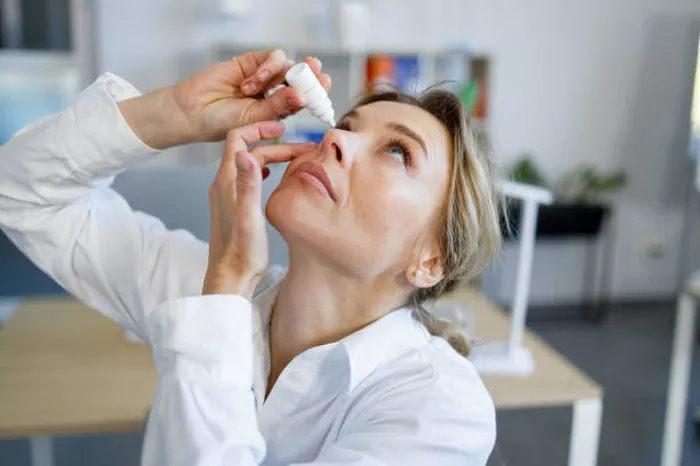Itchy eyes are a common symptom caused by a range of issues such as allergies, environmental irritants, dryness, and infections. When left untreated, they can lead to persistent discomfort, blurred vision, and even inflammation. Fortunately, many over-the-counter (OTC) eye medications are designed to relieve itching effectively and safely.
This article explores the four best types of OTC medications for itchy eyes, helping you choose the right treatment based on the underlying cause of your symptoms.
1. Antihistamine Eye Drops
What Are Antihistamine Eye Drops?
Antihistamine eye drops are specifically formulated to treat itchy eyes caused by allergies. These medications block histamines, which are chemicals your body produces during an allergic reaction. Histamines bind to receptors in the eyes, causing itching, redness, and swelling. Antihistamines stop this process at the source.
Common Uses
These drops are ideal for individuals who suffer from:
- Seasonal allergies (pollen, grass, mold)
- Pet dander sensitivity
- Dust mite exposure
Popular OTC Options
Some of the most recommended OTC antihistamine eye drops include:
- Ketotifen fumarate (Zaditor, Alaway): Offers relief for up to 12 hours.
- Olopatadine (Pataday Once Daily Relief): Known for strong antihistamine action and long-lasting protection.
Benefits
- Quick onset of relief (within minutes)
- Long-lasting effects (8–12 hours)
- Non-drowsy
Considerations
These drops are generally safe for regular use but should be used according to the label instructions. If symptoms persist, consult a healthcare provider to rule out more serious eye conditions.
2. Lubricating Eye Drops (Artificial Tears)
What Are Lubricating Eye Drops?
Also known as artificial tears, lubricating eye drops relieve itchy eyes caused by dryness and environmental factors. They mimic natural tears to moisten the surface of the eye and flush out irritants.
Common Uses
Lubricating eye drops are helpful for:
- Dry eye syndrome
- Wind or smoke exposure
- Screen fatigue (computer vision syndrome)
- Aging-related tear deficiency
Popular OTC Options
Some trusted brands of artificial tears include:
- Systane Ultra Lubricant Eye Drops
- Refresh Tears
- Blink Tears
There are also preservative-free formulations, which are better for people with sensitive eyes or those who use eye drops frequently.
Benefits
- Immediate soothing effect
- Safe for frequent use
- Helps flush out allergens and irritants
Considerations
Unlike antihistamines, lubricating drops do not target allergies directly. However, they can be used in combination with antihistamines for comprehensive relief. For chronic dry eye, a long-term eye care routine may be necessary.
3. Decongestant Eye Drops (Redness Relievers)
What Are Decongestant Eye Drops?
Decongestant eye drops reduce redness by shrinking the tiny blood vessels in the eye that become enlarged due to irritation or allergies. These are sometimes called vasoconstrictors and are often included in combination drops that also contain antihistamines.
Common Uses
These drops are best for:
- Red eyes due to minor irritation or allergies
- Temporary relief from environmental irritants (dust, smoke)
- Enhancing eye appearance (reducing “bloodshot” eyes)
Popular OTC Options
Well-known decongestant eye drops include:
- Naphazoline (Clear Eyes Redness Relief)
- Tetrahydrozoline (Visine Original)
Some brands also combine decongestants with antihistamines for dual-action relief, such as Visine-A.
Benefits
- Quick reduction in redness
- Effective in improving appearance
- Fast symptom relief
Considerations
Decongestant drops are not suitable for long-term use. Prolonged use can lead to rebound redness, where symptoms worsen after the drops wear off. Use these sparingly and only as directed.
4. Mast Cell Stabilizer Eye Drops
What Are Mast Cell Stabilizer Drops?
Mast cell stabilizer eye drops prevent the release of histamines and other inflammatory substances from mast cells in the eyes. Unlike antihistamines, which block existing histamines, these drops work as a preventive measure to stop allergic reactions before they start.
Common Uses
Mast cell stabilizers are useful for:
- Preventing seasonal allergy flare-ups
- Chronic allergic conjunctivitis
- Long-term allergy management
Popular OTC Options
Some OTC drops offer dual-action formulas that combine antihistamines and mast cell stabilizers:
- Alaway
- Zaditor
- Pataday (0.2% version)
These provide both immediate and preventative relief.
Benefits
- Prevents future allergic responses
- Long-term control for allergy sufferers
- Non-steroidal and generally safe
Considerations
Mast cell stabilizers may take a few days of regular use to become fully effective. They are not meant for instant relief but are excellent for individuals with recurring seasonal symptoms.
When to See a Doctor
While OTC medications are effective for most cases of itchy eyes, some situations require professional evaluation. Consult an eye doctor if:
- Symptoms last more than a week
- You experience pain, vision changes, or sensitivity to light
- There is discharge or crusting on the eyelids
- OTC treatments do not improve your symptoms
Eye infections like bacterial conjunctivitis may mimic allergy symptoms and require prescription antibiotic drops.
Tips for Using OTC Eye Drops Safely
To ensure you get the best results from OTC eye drops, follow these safety tips:
- Wash your hands before touching your eyes or applying drops.
- Avoid touching the dropper tip to your eye or fingers.
- Follow dosage instructions precisely.
- Use one type at a time unless otherwise directed by a healthcare professional.
- Store properly according to package instructions.
Preservative-free single-use vials are best for people who use drops multiple times a day, as they reduce the risk of irritation and infection.
Final Thoughts
Itchy eyes are an irritating but often manageable condition. By understanding the underlying cause—whether it’s allergies, dryness, or irritation—you can choose the most effective over-the-counter eye drops for relief. The four best types of OTC medications for itchy eyes include:
Antihistamine eye drops – best for allergy-related itchiness
Lubricating eye drops – best for dryness and environmental factors
Decongestant eye drops – best for redness and irritation
Mast cell stabilizer drops – best for preventing allergy flare-ups
With careful use and the right product, most people can find fast and lasting relief from itchy eyes. If symptoms persist or worsen, always consult a medical professional for guidance.
You Might Be Interested In:

